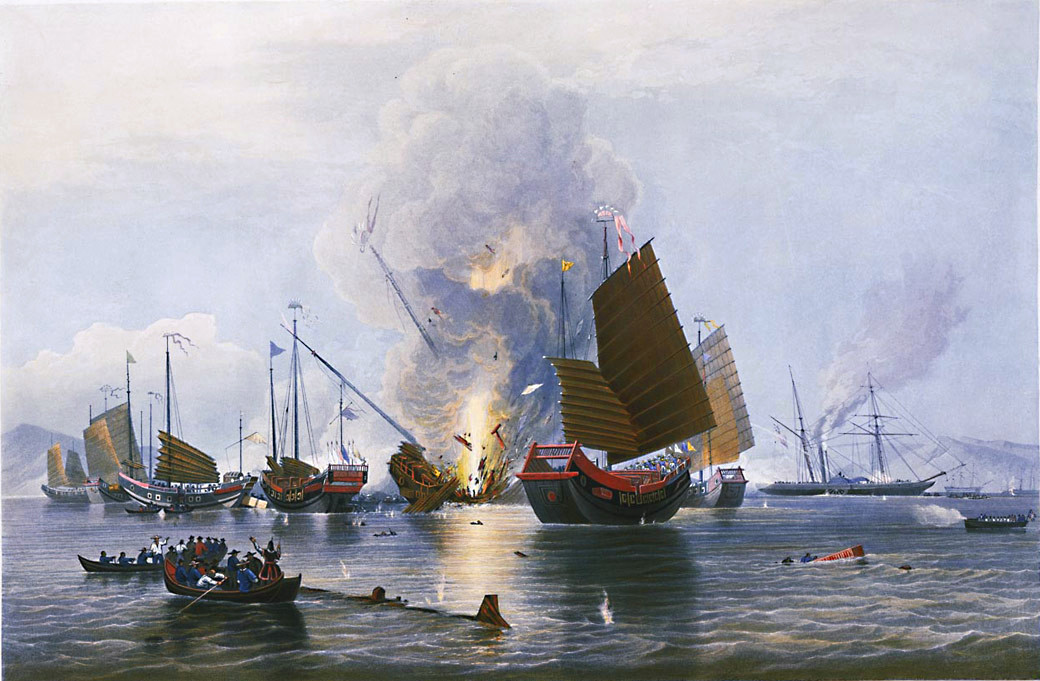For this week, I used Exploration Pack Two: Opium War. The Opium Wars were a major conflict with the West and a factor which led to the decline of the Qing Empire. A central question we discussed in class was whether the Qing Empire collapsed from within or as a result of foreign aggression. In the case of the Opium Wars, I think it was both. The British and the Chinese had some responsibility for the Opium Wars. Some Chinese people smuggled opium into their country. In class, we also talked about how the Qing government underpaid its officials. According to Sources of Chinese Tradition: From 1600 through the Twentieth Century, “Smuggling, moreover, proved lucrative not only for the direct participants but for local officials as well, who could be bribed to keep hands off the illegal traffic” (Bary and Lufrano, 200). Qing officials needed the money so they took bribes from the British and did not stop the smugglers.
An interesting issue raised by the primary sources was the internal conflicts of British traders who relied on selling opium to the Chinese and the ways in which these traders justified their actions. We read transcriptions of the journal of William Almack, a British tea trader in Canton, China. His journal was written between 1837 and 1841. I thought this was one of the most important quotes, on page 59:
“I had not been long in China before I had made up my mind that, Opium having the injurious effects that it is universally acknowledged to have, is a curse to the Chinese people + ought not to be engaged in by any person who really wishes the happiness of his fellow beings (not to mention its illegality)– that it is a pity it should be encouraged by the East India Company who derive a large revenue from it _ that it renders us hated by the good amongst the Chinese (few tho’ they be) – that it is constantly throwing obstacles in the way of the legitimate trade and I believe that those who are attempting to teach the Chinese the Christian religion find it a great stumbling block in their way, being frequently asked “How can you possibly call that a good and true religion whose professors heartlessly feed our people with this vile poison?”
I think Almack may have been struggling with guilt because he recognized how harmful opium was. Almack was in a complicated position because the tea trade at this time was inextricably linked to the sale of opium. The British East India Company traded opium from colonial India for silver from Chinese merchants, indirectly through private firms, and then they used that silver to buy tea (Standage 208). Even though Almack himself was not selling opium directly to the Chinese, his business was dependent on its sale. This raises the question of how much responsibility tea traders had for the problems caused by opium. This section also shows the racist attitudes of nineteenth century British people. Almack seemed concerned about the Chinese people, but he said that “the good amongst” them were “few.” He seemed to have a negative view of Chinese people more broadly. Additionally, part of the reason why he was concerned about the British selling opium to the Chinese was that it made British missionaries look bad. It seemed hypocritical that the same people who were partly responsible for widespread drug addiction were also trying to present themselves as moral to get Chinese people to convert to Christianity. I would see this attitude today as disrespectful to Chinese religions because people should be able to practice what they believe in, and they do not need “saving” from outsiders, but it was more common at the time for British Christians in the nineteenth century to think that their religion was superior.

https://commons.wikimedia.org/wiki/File:Destroying_Chinese_war_junks,_by_E._Duncan_(1843).jpg
Sources:
Almack, William. Journal (July 1837- July 1841), MS Add.9529. Cambridge University Library, Department of Manuscripts and University Archives.
Sources of Chinese Tradition: From 1600 through the Twentieth Century, Vol. 2, 202-205. Edited by Wm. Th. de Bary and R. Lufrano. Columbia Univ. Press, 2001.
Standage, Tom. A History of the World in 6 Glasses. New York: Walker & Co, 2005.
Leave a Reply